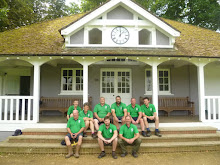In recent weeks it has been noticed that Crows and Magpies have been gathering at the bottom of the Provost's lawn, pecking at the grass, making a mess. Another area of lawn, looking in bad shape with patches of dead grass, can be found in the back of one of the college properties. The culprit, Chafer Grubs, their favourite delicacy is grass roots.
Adult beetles lay their eggs in the turf, May to June, hatching a few weeks later. The grubs then feed on the roots and, as they reach their maturity in the autumn, the damage becomes more noticeable. The grass dies and, in the case of the Provost's lawn, the birds start to peck at the grass, feeding on the grubs. (Thank you birds for bringing it to our attention!)
Using a biological control, rather than a chemical one, Joss treated the area with 'Nemasys G', a microscopic worm, the Nematode, Heterohabditis megidis. Applied with the walkover sprayer, the nematodes, 250 million per tray, are mixed with water, and sprayed onto the affected areas. They enter the grubs, stopping them from feeding within three days of infection, causing them to die within 10-14 days. They complete their life cycle inside the grubs, then move into the soil to search for the next host, naturally occurring, they are safe, harmless to humans, pets and wildlife.






No comments:
Post a Comment